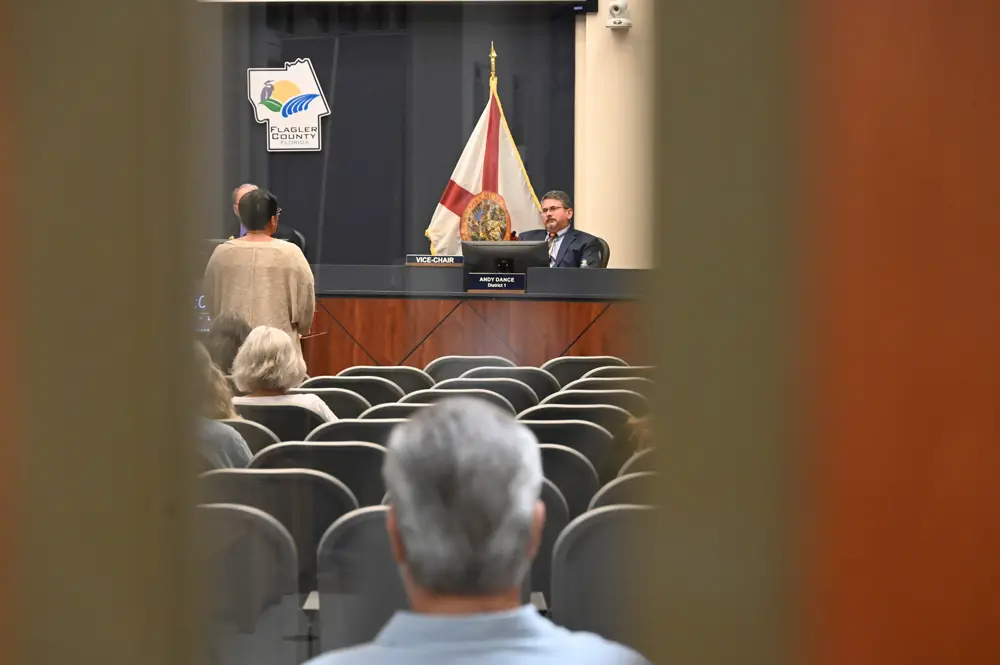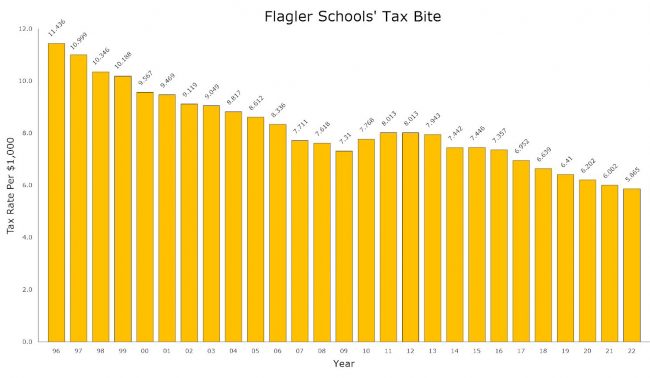
Whichever way you look at it, the Flagler County Commission’s and its administrator’s letter to the school district calling for a plan to defund the county’s portion of money for school deputies was clumsy, terribly timed, and an unnecessary invitation to political grandstanding in an election year.
 Headlines did not make this issue go “sideways,” as Commission Chairman Andy Dance put it. The explicit wording of Administrator Heidi Petito to Superintendent LaShakia Moore did. She was following up on commission direction in December to reconsider “legacy” funding to the school district–a terribly tendentious term that falsely suggests outdated commitments. There’s nothing outdated about funding school cops.
Headlines did not make this issue go “sideways,” as Commission Chairman Andy Dance put it. The explicit wording of Administrator Heidi Petito to Superintendent LaShakia Moore did. She was following up on commission direction in December to reconsider “legacy” funding to the school district–a terribly tendentious term that falsely suggests outdated commitments. There’s nothing outdated about funding school cops.
Petito didn’t just follow up. For all her many qualities, that Craig Coffey-like zeal to get things done among them (she rose under his 11-year leadership), she overstepped, overleaped. She left no doubt that the county had already made “an important decision regarding our ongoing financial commitments to the school district.” It had not. But that’s what Petito wrote in her first line.
She left no doubt about what she was referring to, specifying the $1.4 million the county contributes to the district, including the more than $1 million for school deputies. And she left no doubt that “it is necessary for us to establish a transition plan to gradually transfer the financial responsibility for these legacy expenditures to the school district.”
There was no mention of a timeline. Since Petito said the decision was already made, the timeline was implied: we need to get this done. There were no qualifiers. There was no assurance that the county would do all it could to ensure that replacement money was in place first, other than “exploring any potential solutions or strategies that may help ease the transition.” The focus again was on that word: transition, meaning the end of county funding. There certainly was nothing about this being just a discussion item, a conversation opener, an issue to discuss and debate, as Dance and a school board member later tried to paint it.
There’s no way around it: Petito was saying in black and white that the county intends to defund its share of school deputies, period. (The word defund now has regrettable ideological connotations. In this case, it is the precise word.)
The backlash has been immediate and bitter, justifiably so. Dance is baffled. So are many of us–about Dance’s misjudgment. He is just about the most accomplished, experienced and effective elected official in Flagler County today. (David Alfin doesn’t have the breadth of his experience and Colleen Conklin’s minority status marginalizes her effectiveness.) He’s on a commission losing two long-serving moderates (Donald O’Brfien and Dave Sullivan). The county can’t afford to lose him, too. Yet here he is, opening a gaping, unnecessary vulnerability to his re-election. Of course politicians shouldn’t pander or worry about timing. But there are times when losing sight of the larger picture is risky.
This is one of those times, and Dance lost sight, both about the election and the merits of his “legacy” proposal.
Constituents may have taken the proposal more seriously had it not been pitched in the context of a County Commission obsessed with lowering its tax rate. So the defunding is not really for lack of money, but to give property owners yet another break–even though homesteaded property owners have been on easy street for a decade and a half.
Example: Dance’s property and mine are almost identically valued and have had similar appreciation histories. In 2010, he paid $2,275 in combined property taxes, $659 to the county’s general fund. I paid $2,193 and $605. Our bill this year? Dance is paying a combined $2,107, with $882 to the general fund, I’m paying $2,156, of which $865 for the general fund.
Our taxes have gone down in 13 years. In inflation-adjusted numbers, they’ve gone down even more–34 percent. (If our taxes had just kept up with inflation, he would have been paying $3,238, I’d have been paying $3,121.) Even our county taxes are lower today than in 2010 when adjusted for inflation.
That’s what being homesteaded is all about: Dance and I are not paying our fair share. Our taxes are being subsidized by the non-homesteaded–by renters, by businesses, by new homeowners. Yet the County Commission wants to cut the tax rate and end its “legacy” funding (and the state wants to give the homesteaded an additional exemption). Indefensible.
 In an hour-long conversation with Dance, he made it very clear that he has no intention of pulling the county’s commitment to school deputies. “I do not want to impact any of the progress I’ve made as a school board member that would reduce services,” he said. (He served a dozen years on the school board before his election to the commission.) “We did not say anything about reducing services. We did not say anything about a timeline.”
In an hour-long conversation with Dance, he made it very clear that he has no intention of pulling the county’s commitment to school deputies. “I do not want to impact any of the progress I’ve made as a school board member that would reduce services,” he said. (He served a dozen years on the school board before his election to the commission.) “We did not say anything about reducing services. We did not say anything about a timeline.”
Dance insisted that all he was doing, all that the county is doing, is opening a discussion. “We do not want a level of service drop. I worked too hard to get there.” He does not believe there are sacred cows, and he’s right. The whole intention, he said, is to find a different way to pay for the current level of service. If there isn’t one, then things stay as they are. In his own words: “I am not disassembling what we worked on. We will go back to this formula if we have to go back to this.”
That’s reassuring. But that’s not what Petito’s letter said, and it’s not what Dance or his colleagues said at the commission, even when they had a chance to clarify their approach last Monday. Had any of this been said, had Petito reflected it in her letter, none of this would be an issue. So there’s a considerable amount of walking back taking place.
That said, and putting aside the county’s indefensible lurch for cutting the tax rate while talking “transitions,” there’s also merit to Dance’s approach, and some history behind it: the county, he told me, has been attempting to have this conversation with the district since before Moore took over. The district has ignored the requests. The county got exasperated. Petito’s letter was one result. So she, too, can’t bear all the blame: the school district is not being straight with the county, particularly when the district is far from innocent.
Here’s the dirty secret of school district Safe Schools money. (Safe Schools is what the state calls its annual allocation for security in schools.) In 2020-21, the last complete year for which figures were readily available (getting timely information from the school district these days is impossible), the district actually made a profit on its Safe Schools allocation. The state appropriated $882,186 to Flagler. The district’s contract with the sheriff appropriated $748,162, leaving a net profit to the district of $134,024. (Don’t take my word for it: here’s the state allocation, here’s the district’s contract.) Palm Coast annually picks up the cost of one of the 14 deputies in schools.
Even when you include the $103,000 the district spent on crossing guards, it still came out ahead. In other words, the district’s general fund budget was entirely spared by any money spent on deputies. You can’t say the same about the county, whose every dollar contributed to school deputies comes out of the general fund.
The local district does not set its property tax rate. The Legislature does. So if we’re going to take the county to task for its tax-cutting obsession, the state has outdone counties manyfold in that regard. The state has reduced the school tax by more than half since 1996, with cuts every year for the past 10 years. If the state wanted to fund security, it could.

But the state is not interested in responsibly paying for school security. It’s not even paying a bare minimum. For Flagler, it’s paying half the bill. None of that is going to change, so looking to the state for a better Safe Schools formula is idle talk.
Nothing in state law requires districts to hire professional law enforcement. To the state, anybody with a uniform and a gun will do. That means cheap, barely trained, poorly paid warm bodies called “security guards.” That means armed school employees who think being called “guardians” and having a gun will protect students, when it will more likely endanger them.
If we must have an armed presence, there is no substitute for professional law enforcement. In Flagler, there is no substitute for sheriff’s deputies from a department that prizes community engagement and de-escalation. This “transition” proposal will only open the door, one way or another, for our pathologically clueless school board once again to push for arming staffers. That would be fueling stupidity with folly.
Finally, while it’s true that state and federal funding control most of the local school district’s budget, it’s not true that the school board doesn’t have taxing authority. It can levy a local property surtax, just as it levies an extra half-penny sales surtax.
Voters have repeatedly approved the sales surtax. They used to routinely approve the property surtax. In 2013, the school board “got greedy,” in Dance’s apt words. It sought to double that property surtax, going from a quarter mil to half a mil, ironically on the pretext that, after the Sandy Hook massacre, the district needed more money for school deputies. Voters rejected the tax.
So while voters may claim to love their school deputies, they, too, aren’t eager to pay for them. That was 10 years ago. Maybe if the district tried again in this post-Parkland era it would get a different result, though I doubt it: this school board has obliterated voters’ trust beyond repair, so any referendum will have to wait until a majority with at least some intelligence and accountability is seated.
Meanwhile Petito and Moore will talk. They’re scheduled to meet next Wednesday, though that meeting is now moot. They’ve been outflanked by a reality they do not control. They’ll go through the motions, they’ll issue the obligatory sap about terrific cooperation and ongoing dialogue. Their bosses will parrot it all. But whatever they say, deputies aren’t going anywhere, nor is the county’s funding, because if there’s ever been a third rail in local government, Andy Dance and Heidi Petito just got zapped.
![]()
Pierre Tristam is the editor of FlaglerLive. A version of this piece airs on WNZF.










